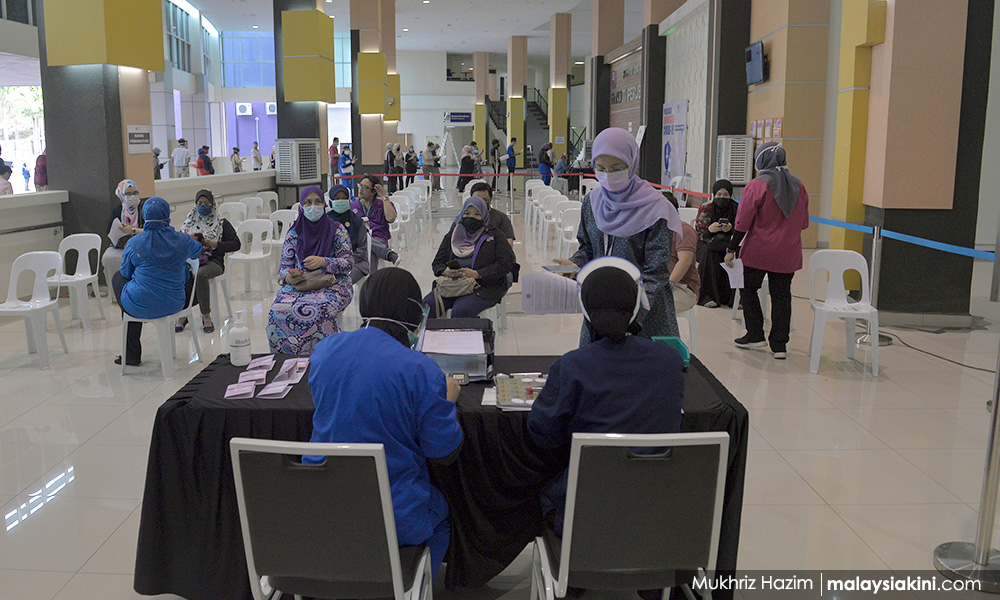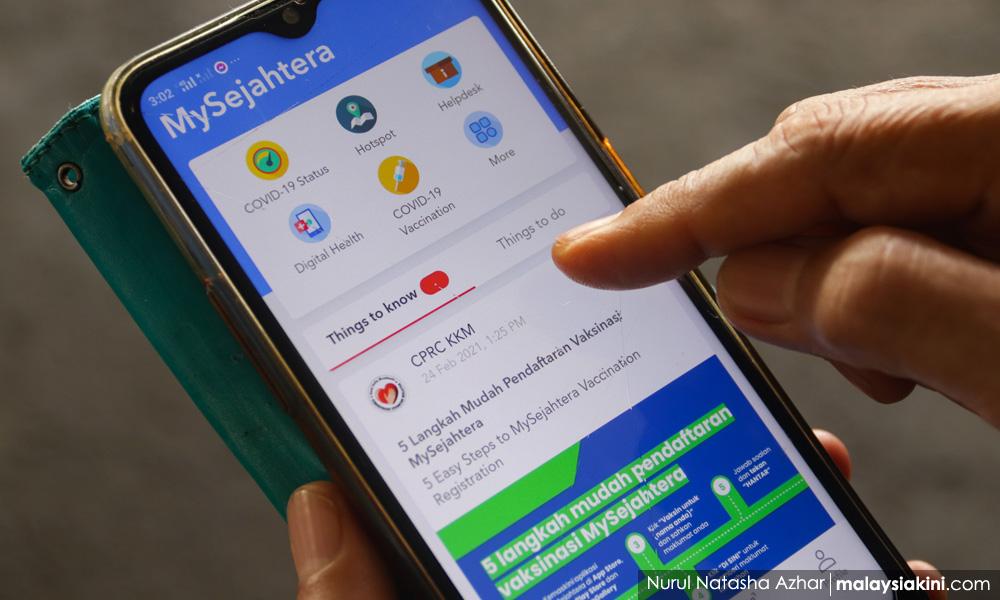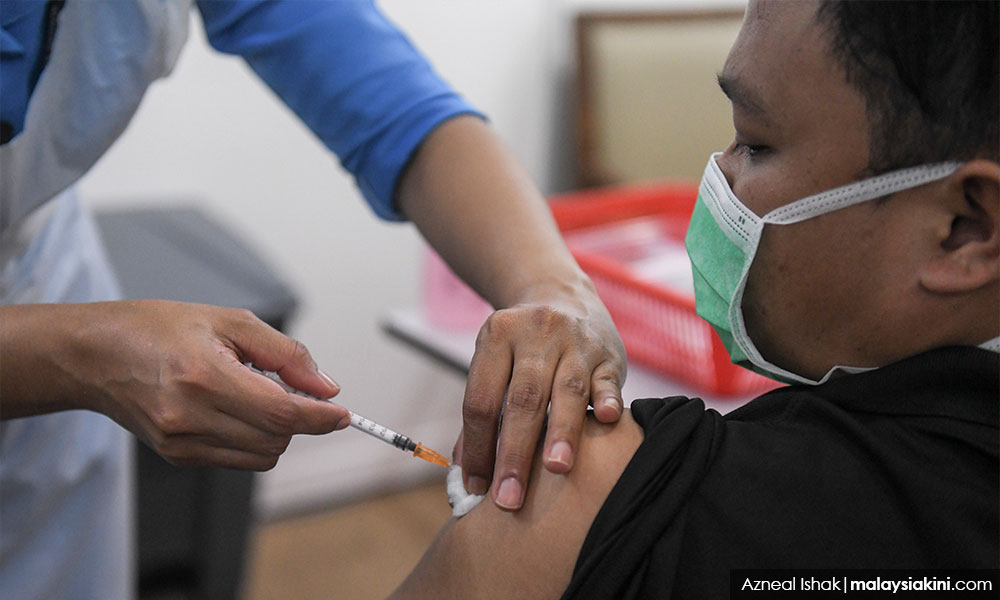MP SPEAKS | In the lead-up to the start of phase two of the National Covid-19 Vaccination Programme, there are many questions which need to be asked and hopefully answered.
We commend the job which Coordinating Minister of the Covid-19 National Immunisation Programme Khairy Jamaluddin has carried out thus far under challenging circumstances.
We hope that he can respond to the following 10 questions as phase two starts on April 19.
1. What is the geographical distribution of those above 60 who have yet to register for the Covid-19 vaccine?
Khairy has stated previously that due to the lower-than-expected vaccine registration rates among those who are 60 and above, phase three registrants will be vaccinated together with those who are scheduled for vaccination under phase two. He was also reported as saying on March 29 that only two million senior citizens have registered for phase two of the vaccination programme representing only 22 percent of the target. This means there are approximately seven million senior citizens who have yet to register for the vaccine.
At the time of writing, we don’t know which states/districts they may possibly be located in.
This would be useful information for us to know so that more targeted efforts can be used in order to get more senior citizens to be registered for the vaccine.
2. What steps have been taken to work with state governments in order to increase the vaccine registration rate?
State governments have access to some data for those who are aged 60 and above. For example, in Selangor, those who are 60 and above are eligible to be registered under Skim Mesra Usia Emas. In Penang, there is the senior citizen’s acknowledgement programme for which all senior citizens above 60 are eligible.
As far as we know, there has not been any concerted effort to work with the state governments such as Selangor and Penang to mobilise the state government machinery, the elected representatives and NGOs to register these senior citizens based on existing databases.

Of course, the state governments can mobilise on their own without any initiation on the part of the Federal Government, but given that the Federal Government is taking the lead on this programme, it would be very helpful and, perhaps, even necessary for the Federal Government to take the initiative, give the endorsement for and cooperate with the respective state governments to take the necessary actions to register as many senior citizens as possible for the Covid-19 vaccine.
3. Will the two-week notice for vaccine takers which was initially promised by Khairy be followed? What other measures can be used to reach out to those who have not confirmed their appointments via their MySejahtera app?
Khairy promised on March 29 that those who have their vaccination appointments during phase two will be given a two-week notification via the MySejahtera application, phone calls and SMS. Anecdotal evidence thus far seems to indicate that many people have not received any notifications yet via one or more of the channels indicated by the minister.
Many people are feeling anxious and are checking their MySejahtera app regularly either for themselves or for their dependents/parents. At the other end of the scale are those senior citizens who are not technology-savvy and probably had someone else register them for the Covid-19 vaccine and who have yet to respond to their MySejahtera and/or SMS notification. Khairy indicated as much when it was reported on April 12 that more than half of those initially notified has not responded to confirm their appointment dates.
We need to understand the reasons for the low response rate if we are to increase the positive response rate. Other than not being technology-savvy, the issue of some senior citizens not being able to read and understand Bahasa Malaysia could also be another reason. Solutions such as voice messages, in more than one language, could be used, moving forward.

4. Has the list of vaccination centres been confirmed? Will it be published soon?
At the time of writing, the full list of vaccination locations by state for phase two has not been publicly announced yet.
Although each person will be given the clinic/exact location of where they will receive their vaccination, it would be useful if the full list of vaccination locations is published so that those who have their doubts about the location can refer to a verified list. This should include private clinics and hospitals which have signed up to be part of the vaccination programme.
5. Will there be translations for senior citizens who may not be very well-versed in BM? Will other assistance also be provided for those who are illiterate?
The process of vaccination will be challenging for those senior citizens who are illiterate, hard of hearing, have bad eyesight and/or are not so well-versed in BM. There are many forms to be completed, apps to be scanned and also one briefing to listen to.
It would not be surprising to us if some senior citizens find the entire process too stressful and this may affect their physical health before, during and after taking the vaccine. Hopefully, at each of the vaccination location, such issues would have already been considered and sufficient steps undertaken to minimise the stress for the senior citizens.
6. Do we have sufficient manpower to increase the number of vaccinations per day four-fold from 40,000 per day to 160,000 per day?
During phase one, the average number of daily vaccinations was less than 40,000. The target for phase two is 160,000 per day. Do we have the capacity in terms of nurses and doctors to ramp up to this number? Even with the inclusion of private GPs and hospitals in the vaccination process?
7. Are there any contingency plans in place to have “volunteers” to be vaccinated in case those who have confirmed their registration do not show up?
One would expect there to be some absenteeism among those who have confirmed their appointments based on the experience of other countries. The strategy or standard operating procedure (SOP) in many of these countries is to have a queuing system or database where people can be informed if there are leftover vaccines which must be used before they expire in case there are people who do not show up for their appointments.
As far as we know, there is no such system in place in Malaysia. But we feel that this is a necessary step in the vaccination process so that vaccine wastage can be minimised.
8. How will the supply of Covid-19 be affected by continued uncertainties?
Khairy has said that we have sufficient supplies of Covid-19 vaccines to cover more than 80 percent of the population (including foreign workers), which is the percentage needed to achieve herd immunity. But there remain outstanding concerns with regard to the authorisation of the SPUTNIK vaccine by National Pharmaceutical Regulatory Agency (NPRA) (very few countries seemed to have authorised its usage), and also ongoing concerns on the small risk of developing blood clots via the Astra Zeneca vaccine which have made some countries like Denmark stop the use of the vaccine (at least for now).

What contingency plans does Khairy have in order to address some of these issues with regard to the supply of some of these vaccines? Will there be any further delays in the supply of some of these vaccines because of vaccine nationalism on the part of the European Union and India?
9. Can vaccination be made compulsory? Is this constitutional? What other methods can be used, for example, vaccine passport and allowance for activities?
The minister was reported to have said on April 9 that vaccine registration could be made compulsory if the numbers of vaccine registrations remain low. Is this legal and constitutional? We take note that even taking the BCG vaccine jabs are not compulsory for children who go to school. Can vaccine registration and later vaccine inoculation be made compulsory?
Surely other incentives such as allowing those who have been vaccinated to do certain activities, for example, vaccine passports, should be considered before a move for compulsory vaccination be made.
10. How effective and efficient is the Covid-19 call centre? Does it require more resources in terms of more callers who can speak different languages to call up those whose appointments are upcoming? Can we utilise technology such as chatbots and Artificial Intelligence to respond to queries on phase two and Phase three appointments?
There is supposed to be a Covid-19 vaccination call centre, but we are not sure as to how well it is functioning. At the time of writing, we do not know how many people are manning this call centre, whether this number of people is sufficient, which ministries they are from (or this function has been outsourced to a private company), what training this group of people have received and so on.
We would definitely be interested to visit this call centre so that we can better understand how well it is functioning. And if we feel that there needs to be more resources allocated to this call centre, we would definitely support the minister’s appeal for more funding and other useful resources.
ONG KIAN MING is MP for Bangi and assistant political education director of the DAP. KELVIN YII is MP for Bandar Kuching and a member of the Health, Science and Innovation Parliamentary Special Select Committee.
The views expressed here are those of the author/contributor and do not necessarily represent the views of Malaysiakini.

